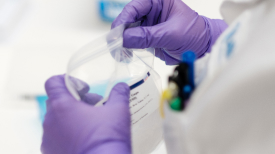- Cancer Care Team
Cancer Care Team
To deliver optimal patient outcomesProducts and Services
Cancer Type
Supplies & Tools
Scientific Focus
- Biopharma Partners
- Patients
- Education & Events
- Login
- Contact Us
Test Details
 Cancer Type
Cancer Type
Acute myelocytic leukemia (AML), Hematologic malignancies, Myelodysplastic syndrome (MDS), Myeloproliferative neoplasm (MPN)
 Technology Used
Technology Used
Molecular, NGS
 Turnaround Time
Turnaround Time
10 - 14 days
Use
The intended use of this multi-gene genomic panel is in patients with myeloproliferative neoplasms (MPN), myelodysplastic syndrome (MDS), and acute myelogenous leukemia (AML). These disorders are clonal disorders of hematopoietic stem cells and share clinicopathologic features and underlying molecular drivers. Emerging evidence supports the clinical value of simultaneous detection of somatic mutations in multiple genes as markers for neoplastic clonal populations to guide 1) diagnosis, 2) prognostic risk assessment, and 3) therapeutic options.
Special Instructions
Please provide a clinical indication or related ICD-10 code on the requisition. Test will be delayed if the clinical indication is not received. Please direct any questions regarding this test to customer service at 800-345-4363. For more information, please visit oncology.labcorp.com/cancer-care-team/test-menu/intelligen-myeloid.
Test Includes
ABL, ASXL1, BCOR, BCORL1, BRAF, CALR, CBL, CDKN2A, CEBPA, CSF3R, CUX1, DNMT3A, ETV6, EZH2, FBXW7, FLT3, GATA1, GATA2, IDH1, IDH2, IKZF1, JAK2, JAK3, KDM6A, KIT, KMT2A, KRAS, MPL, NF1, NOTCH1, NPM1, NRAS, PDGFRA, PHF6, PML, PTEN, PTPN11, RAD21, RUNX1, SETBP1, SF3B1, SMC1A, SMC3, SRSF2, STAG2, TET2, TP53, U2AF1, WT1, ZRSR2.
Limitations
The sensitivity of this assay is 5 to 10% variant allele fraction for single nucleotide variants (SNV) and insertion/deletions (InDels). Insertions and deletions of any length are detected when at least one breakpoint is contained within an amplicon. Insertions up to 126 bp and deletions up to 52 bp have been detected in clinical specimens. Mutations outside the targeted regions and gene rearrangements will not be detected. Variants are categorized into Tiers based on their clinical impact, following a joint consensus recommendation from the AMP, ASCO, and CAP. Clinical and experimental evidence grouped into four levels (A-D) based on significance in clinical decision making (therapeutic, diagnosis, prognosis) is assigned to variants to determine their clinical significance. Tier 1, Variants with Strong Clinical Significance (level A and B evidence); Tier 2, Variants with Potential Clinical Significance (level C or D evidence); Tier 3, Variants of Unknown Clinical Significance, and Tier 4, Benign or Likely Benign. Results should be interpreted in conjunction with clinical and other laboratory findings for the most accurate interpretation.
This test was developed and its performance characteristics determined by Labcorp. It has not been cleared or approved by the Food and Drug Administration.
Methodology
IntelliGEN® Myeloid utilizes amplicon-based next generation sequencing to identify alterations in 50 genes that have diagnostic, prognostic, and therapeutic significance in myeloid neoplasms.
Related Documents
For more information, please view the literature below.
Specimen Requirements
Information on collection, storage, and volume
Specimen
Whole blood, bone marrow, cell pellets from whole blood, or cell pellets from bone marrow
Volume
3-5 mL (Blood), 1-2 mL (Bone Marrow)
Minimum Volume
3 mL (Blood), 1 mL (Bone Marrow)
Container
Lavender-top (EDTA) tube, green-top (sodium heparin) tube, tan-top (K2-EDTA) tube or pink-top (K2-EDTA) tube
Storage Instructions
Refrigerate.
Causes for Rejection
Specimen does not meet criteria for sample type, container, minimum volume, collection and storage; frozen whole blood or marrow; leaking tube; clotted blood or marrow; grossly hemolyzed specimen or otherwise visibly degraded; contaminated specimen; contains suspicious foreign material
Related Tests
Find more tests related to this one.





